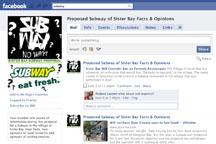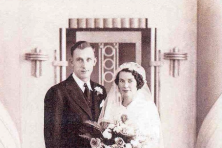Should Government Get Social?
- Share
- Tweet
- Pin
- Share

Log into Facebook and you’ll find debates on anything from politics to chocolate-chip cookies. Discussions on issues like the Subway proposal in Sister Bay have generated countless posts and comments and increased turnout at public meetings. So is it time for local government to jump into the social media fray?
Social media like Facebook and Twitter are used extensively by local business associations to attract tourists, but local governments have not used this type of media yet. Most choose other methods to communicate with constituents.
“We pretty much are posting everything on our website, and we have hard copy newsletters that we do quarterly,” says Nancy Fisher, president of the Village of Egg Harbor. “But we haven’t really gotten into social media yet. I think right now it’s probably most appropriate for our tourist arm, the Business Association and Visitor Center, to be doing that.”
Sister Bay Village President Denise Bhirdo says her community also focuses on its website, and thinks that creating a Facebook page wouldn’t be very beneficial.
“Using social media, they may just be more quick blurbs about what the agenda items are that might be of interest to somebody,” Bhirdo says. “Or a reminder of an important meeting coming up, to keep people on the cusp of things that are happening. But I think the people that would be signing up for it are those who are already interested and would utilize other resources that are already available.”
Fisher says the time it would take to update a Facebook page as well as the village website just isn’t worth it.
“Right now we need our resources allocated differently than concentrating on Facebook and Twitter,” she says.
But there is potential to unlock more involvement through social media. Much of the debate over the proposed Subway in Sister Bay was sparked by Facebook posts. When Bruce Gajewski announced a plan to build a chain restaurant in Northern Door, residents lit up Facebook discussion boards. Between four pages created on the topic, over 1,000 people were involved in the debate.
Mike Termini, who sparked a spirited debate with his Facebook posts on the topic, also drove more people to a plan commission meeting on the issue.
“I was unable to attend the meeting myself; I was going to be out of state,” Termini says. “I guess I was just looking to fill my void. I wasn’t sure about what the turnout was going to be, and I wanted to be sure that there were people in my place to voice their own opinions – not necessarily to voice my opinion – but their own concerns.”
Bhirdo acknowledges that the Facebook pages on Subway got a lot of people interested, but she says that one of them “kind of got off-track, and became very, rude, I guess is one word that I would use.”
“I think the government page is not the place for debate,” Bhirdo continues. “I think it’s a place for information. Now, what people chose to post on that page would be up to them, but I don’t feel whoever would be the administrator of that page, [that] it would be appropriate for them to share viewpoints. That’s very dangerous territory.”
Randy Nesbitt, the attorney for several Door County municipalities, agrees.
“The officials have to be unbiased in the way they approach issues before it comes to them for some type of decision,” he says. “They could be biased and thereby have to withdraw from any discussion. They certainly can’t render opinions on things.”
Nesbitt also says that there is no precedent in Wisconsin for local governments using social media, to the best of his knowledge. But he would advise officials to create government pages, if it was only to post basic information.
“For agendas and things like that, I think it’s a great idea to get that information out to the public,” Nesbitt says. “But in terms of discussion between community members and government officials I would strongly recommend against it.”
But sometimes a simple post with a meeting time and agenda is all it takes to spark a huge discussion, and generate a lot of interest. Liberty Grove Town Chairman John Lowry says the Internet and email have already made town government accessible to a more diverse audience and opened up new avenues for communication.
“There are a lot of people who are definitely more comfortable communicating with the board through email,” Lowry says. “Sometimes we’ll have residents who are well-read and have done a lot of research on a topic that they will send to us, and it really helps inform our decisions.”
Not only is it more convenient for many people to put their two cents in through email or message boards, but it removes the intimidation factor. Many who aren’t brave enough to speak at a crowded meeting are willing to send an email.
The increased conversation from social media may have helped Egg Harbor a year ago, when its marina referendum failed at first, and many voters felt uninformed about the proposal. Or it may not have made any difference.
But Termini still views Facebook as a way for government to start discussion, even if government officials don’t actually participate in that discussion at all.
“They’d just have to be overly careful with their wording,” he says. “Especially if you are a government-based organization, or else people could use that against you. Black-and-white statements, definitely; nothing in-depth. But I think that it’s slowly becoming the best way to get any word out about anything.”
Myles Dannhausen Jr. contributed to this report.

